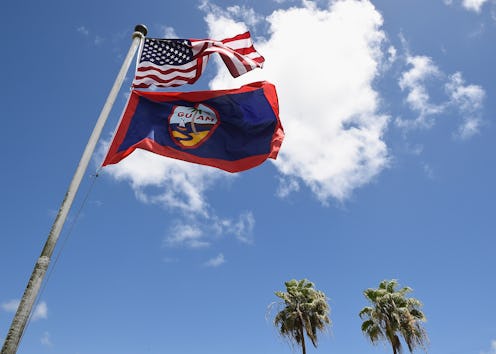News
Guam Just Unveiled An Alarming Guide To Surviving A Nuclear Attack

It's no surprise that tensions between the United States and North Korea are running hot right now. Thanks in large part to U.S. intelligence sources claiming that North Korea has successfully miniaturized nuclear warheads that can be equipped with intercontinental ballistic missiles, and the threats from both sides since, it's clear that this is a highly charged moment. So highly charged, in fact, that Guam is informing its citizens on nuclear attack readiness, and what to do if the worst were to happen.
Although there's no reason to think war is actually imminent or unavoidable ― North Korea has been promising to destroy America and its allies for decades, as such statements serve a purpose as domestic propaganda ― the isolated, repressive state's recent threats against Guam, the U.S. island territory in the South Pacific, clearly sent a message.
In response, the Guam Homeland Security department released a fact sheet detailing exactly what people should do if there's a nuclear strike, and it's a rather harrowing read. Again, it's by no means a foregone conclusion that any of the worst-case scenarios will ever actually happen. But even seeing these sorts of instructions distributed to the public raises a haunting feeling, not unlike the days of Cold War nuclear preparedness drills. Here are some of the takeaway pieces of advice being given to residents of Guam:
1. Prepare A Plan For Supplies And Shelter
Fallout shelters do not need to be specifically constructed for protecting against fallout. They can be protected space, provided that the walls and roof are thick and dense enough (i.e.concrete) to absorb radiation given off by fallout particles.
2. Don't Leave Shelter To Look For Your Family
Find the nearest building, preferably built of brick or concrete, and go inside to avoid any radioactive material outside. ... Stay where you are, even if you are separated from your family. Inside is the safest place for all people in the impacted area. It can save your life. ... Expect to stay inside for at least 24 hours unless otherwise told by authorities.
3. Don't Look At The Explosion
Do not look at the flash or fireball — It can blind you.
4. Take Cover Behind Any Nearby Obstructions
Take cover behind anything that might offer protection. ... Lie flat on the ground and cover your head. If the explosion is some distance away, it could take 30 seconds or more for the blast wave to hit. ... Take shelter as soon as you can, even if you are many miles from ground zero where the attack occurred ― radioactive fallout can be carried by winds for miles. Remember the three protective factors: Distance, Shielding and Time.
5. Clean Off Any Radioactive Particles
If you were outside during or after the blast, get clean as soon as possible, to remove radioactive material that may have settled on your body. ... Remove your clothing to keep radioactive material from spreading. Removing the outer layer of clothing can remove up to 90% of radioactive material.
6. Bag Up Any Contaminated Clothing
If practical, place your contaminated clothing in a plastic bag and seal or tie the bag. Place the bag as far away as possible from humans and animals so that the radiation it gives off does not affect others.
7. Take A Shower, But Don't Use Conditioner
When possible, take a shower with lots of soap and water to help remove radioactive contamination. Do not scrub or scratch the skin. ... Wash your hair with shampoo, or soap and water. Do not use conditioner in your hair because it will bind radioactive material to your hair.
8. If Showering Is Impossible, Wipe Off Your Exposed Skin
Gently blow your nose and wipe your eyelids and eyelashes with a clean wet cloth. Gently wipe your ears. ... If you cannot shower, use a wipe or clean wet cloth to wipe your skin that was not covered by clothing.
9. Listen For Official Instructions
Keep listening for official information about what to do, where to go and places to avoid. ... Stay away from damaged areas, areas marked “radiation hazard” or “HAZMAT.” Remember that radiation cannot be seen, smelled or otherwise detected by human senses.
If you're curious to review the entire document, you can do so here. While Guam is the location most recently threatened by North Korea, it's worth noting that the advice contained within is valuable under any circumstances involving a nuclear attack.